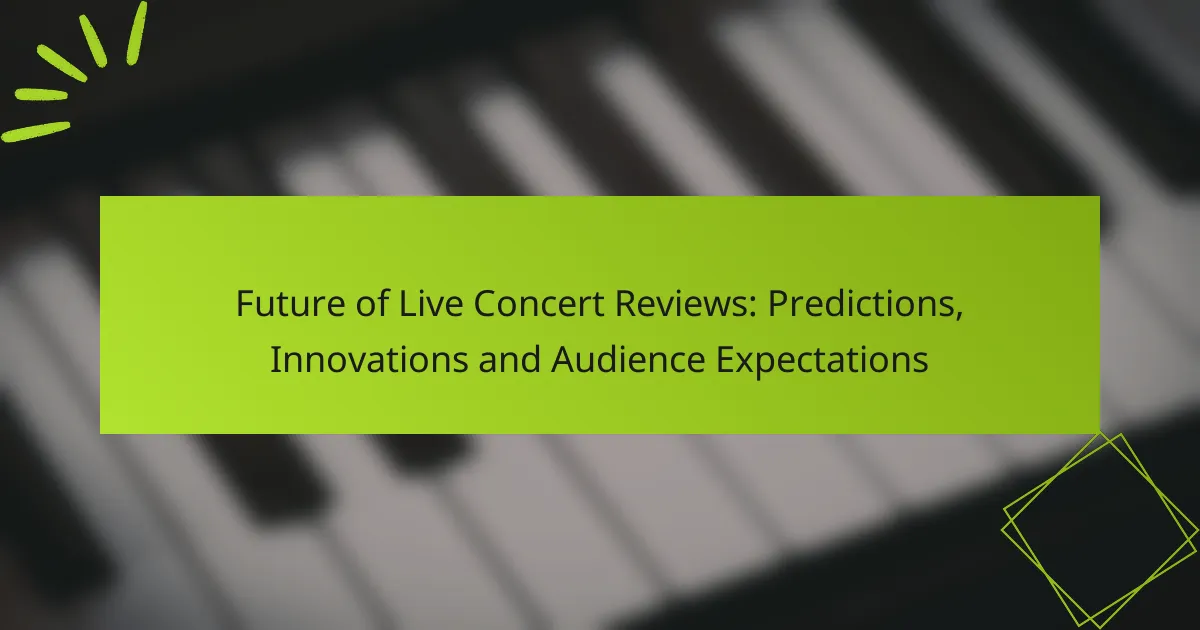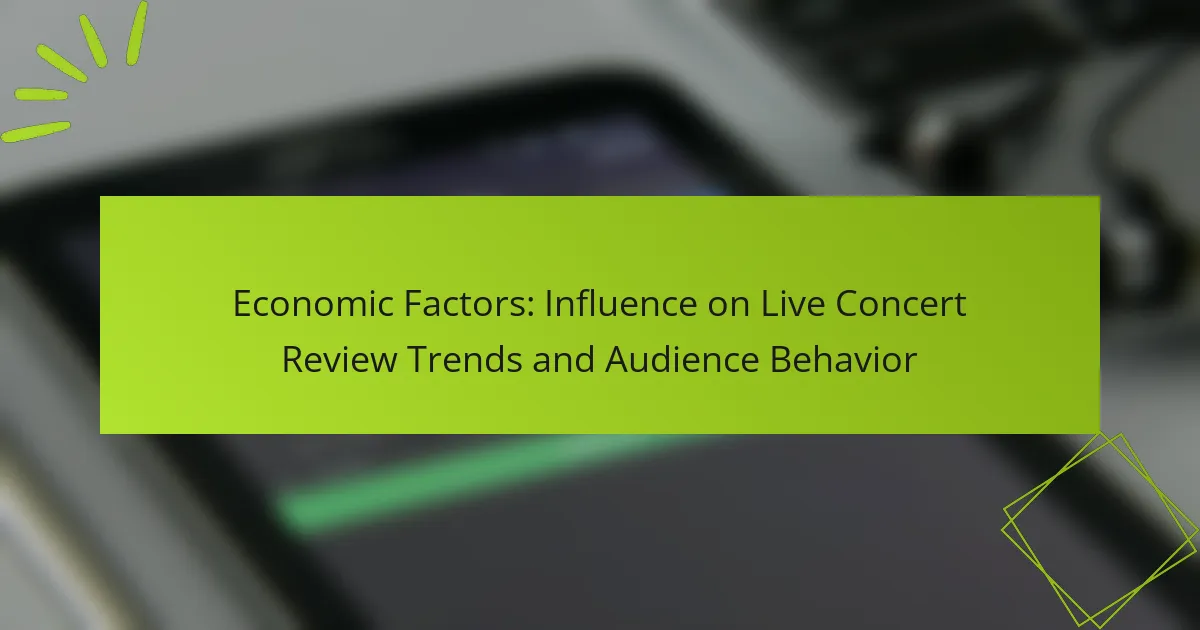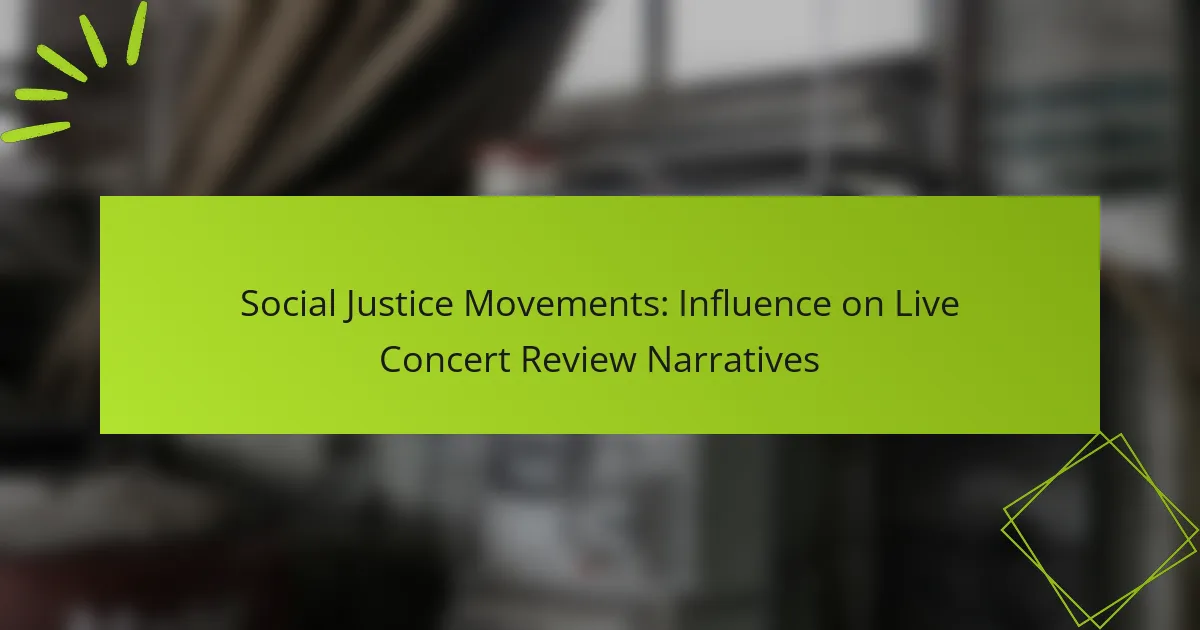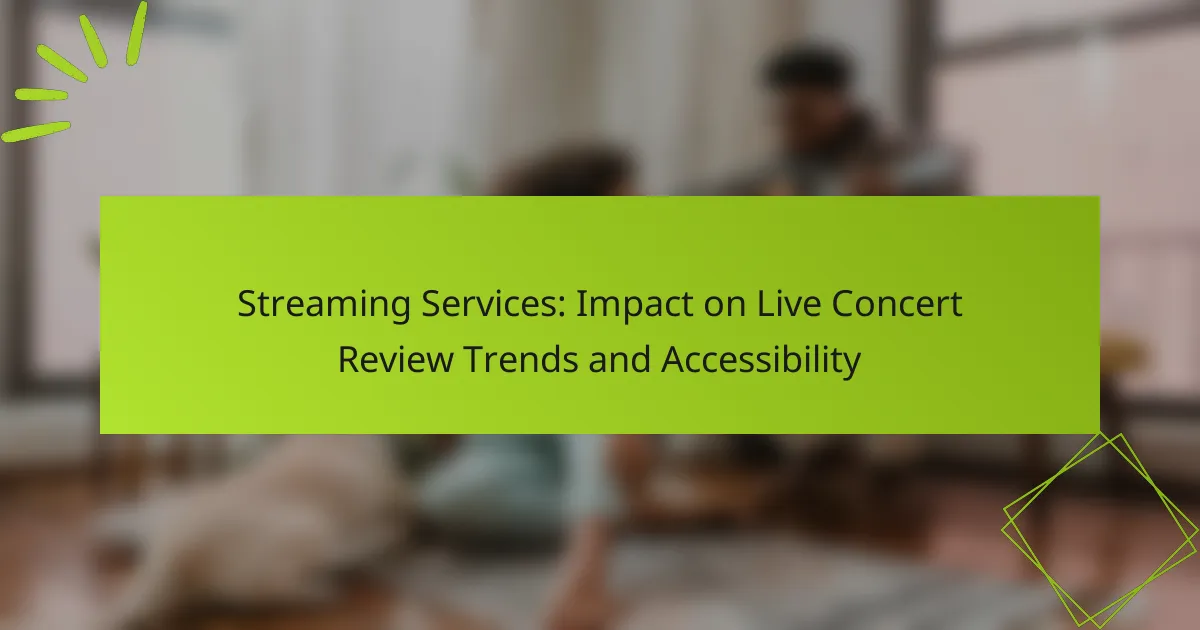The future of live concert reviews is poised for transformation through innovations like augmented reality and AI-generated content, which promise to create more immersive and personalized experiences for audiences. As technology evolves, fans are increasingly demanding engaging insights that reflect their unique perspectives, while social media plays a pivotal role in shaping real-time perceptions and interactions between artists and their audiences.
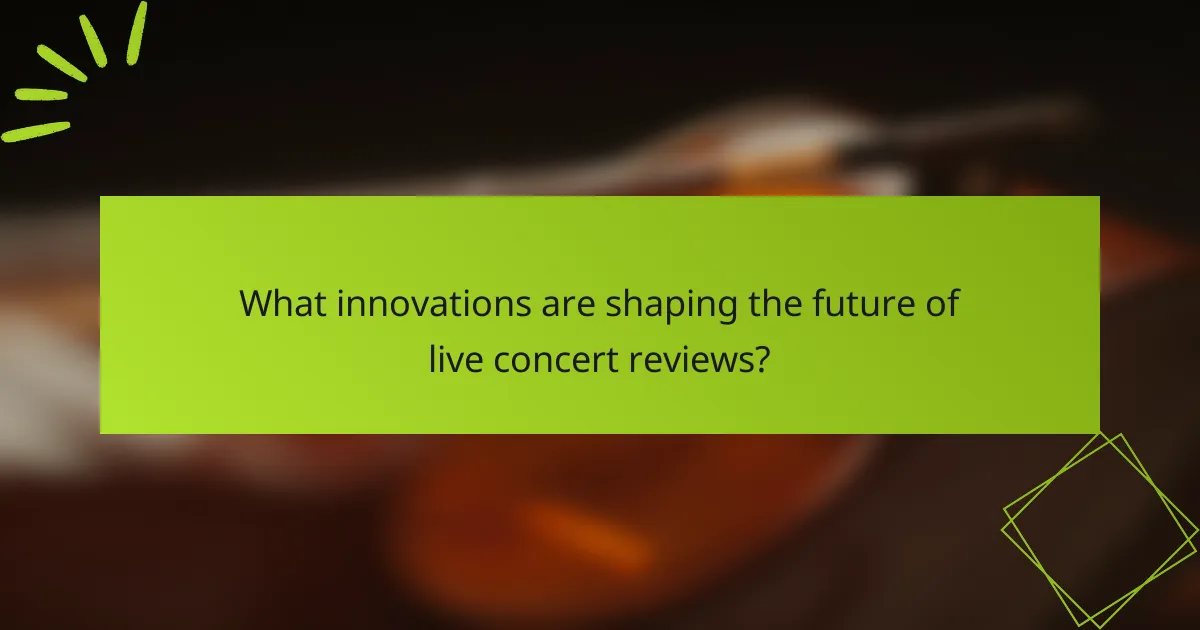
What innovations are shaping the future of live concert reviews?
Innovations such as augmented reality, AI-generated content, real-time audience feedback, and interactive streaming platforms are transforming how live concert reviews are created and consumed. These advancements enhance the review experience by making it more immersive, personalized, and immediate.
Augmented reality experiences
Augmented reality (AR) is set to revolutionize live concert reviews by providing immersive experiences that blend digital elements with the physical environment. For instance, concert-goers could use AR apps to see 3D visualizations of performances or access additional content like artist interviews and behind-the-scenes footage while at the venue.
These AR experiences can enhance engagement, allowing audiences to interact with the concert in real-time. However, ensuring that the technology is user-friendly and accessible is crucial for widespread adoption.
AI-generated content
AI-generated content is increasingly being utilized to create concert reviews quickly and efficiently. Algorithms can analyze setlists, audience reactions, and social media posts to generate summaries that capture the essence of a performance. This technology can produce reviews in a matter of minutes, catering to the demand for timely content.
While AI can streamline the review process, it may lack the emotional depth and personal touch that human reviewers provide. Balancing AI efficiency with authentic insights is essential for maintaining quality in concert reviews.
Real-time audience feedback
Real-time audience feedback is becoming a vital component of live concert reviews, allowing fans to share their thoughts instantly through social media or dedicated apps. This immediate feedback can shape the narrative of a concert review, highlighting popular moments or addressing audience concerns.
Concert organizers and reviewers can leverage this data to create more relevant and engaging content. However, it’s important to manage the volume of feedback to avoid overwhelming both the audience and the reviewers.
Interactive streaming platforms
Interactive streaming platforms are changing the landscape of live concert reviews by enabling viewers to engage with performances from anywhere. These platforms often include features like live chats, polls, and Q&A sessions, allowing audiences to participate actively in the concert experience.
Such interactivity can enhance the review process, as viewers can share their opinions and experiences in real-time. However, ensuring a seamless user experience and managing online interactions effectively are key challenges that need to be addressed.
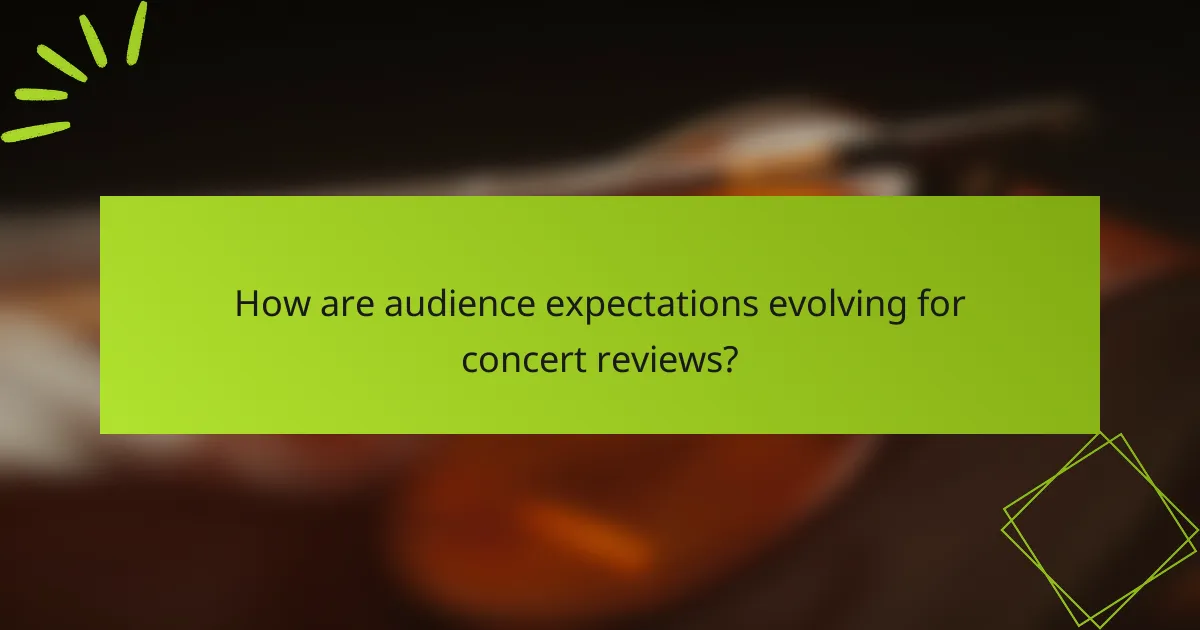
How are audience expectations evolving for concert reviews?
Audience expectations for concert reviews are shifting towards more engaging and personalized content that reflects their unique experiences. As technology advances, fans increasingly seek immersive and authentic insights that resonate with their individual tastes and preferences.
Desire for immersive experiences
Today’s concertgoers want reviews that capture the full essence of live performances, including visuals and sounds that transport them back to the event. This can include multimedia elements like videos, photos, and even virtual reality experiences that allow fans to relive the concert atmosphere.
For instance, reviews that incorporate 360-degree videos or interactive elements can significantly enhance the reader’s experience, making them feel as if they were part of the concert. This trend emphasizes the importance of creativity in presenting concert reviews.
Preference for personalized content
Audiences are increasingly looking for concert reviews that cater to their personal tastes and preferences. This means that reviews should not only cover the performance but also reflect the unique perspectives of different fan demographics, such as age, genre preference, and cultural background.
Platforms that allow users to filter reviews based on their interests or past concert experiences can enhance engagement. For example, a review that highlights a specific artist’s style or setlist can resonate more with fans who have a strong connection to that artist.
Increased demand for authenticity
Fans are becoming more discerning about the authenticity of concert reviews, seeking genuine insights rather than overly polished narratives. They prefer reviews that include honest critiques and personal anecdotes from the reviewer, which can create a stronger connection with the audience.
To meet this demand, reviewers should focus on sharing their true experiences, including both the highs and lows of the concert. For example, mentioning technical issues or unexpected moments can add depth and relatability to the review, making it more trustworthy in the eyes of the audience.
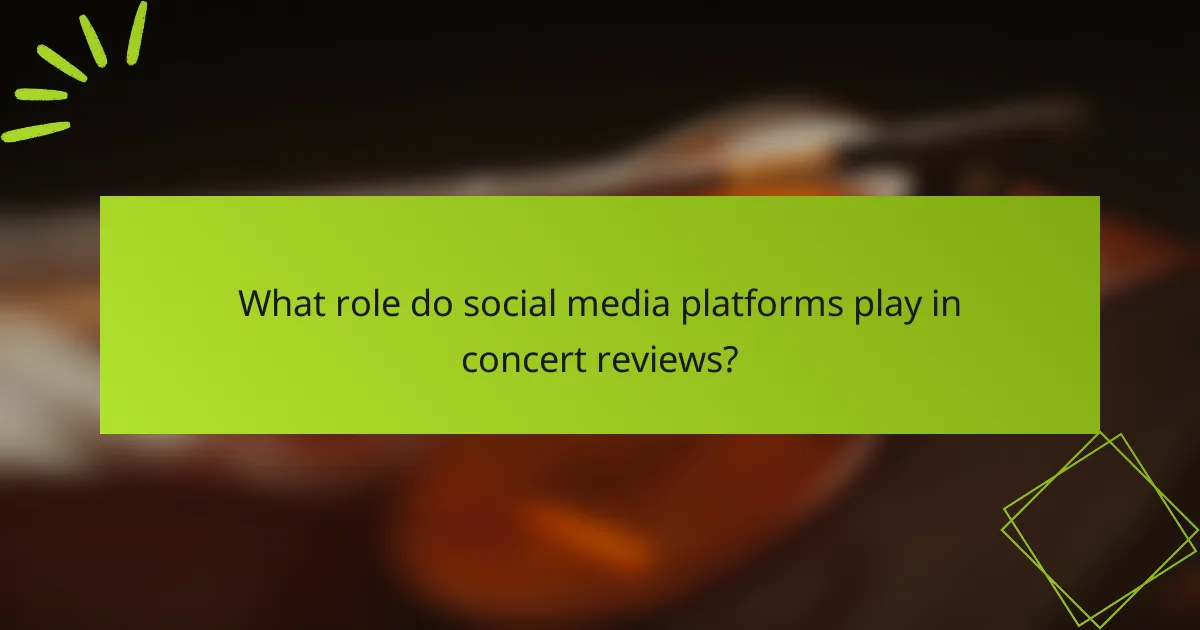
What role do social media platforms play in concert reviews?
Social media platforms are crucial for concert reviews as they enable immediate sharing of experiences and opinions, shaping public perception in real-time. They also facilitate interactions between artists and fans, enhancing the overall concert experience.
Real-time sharing of experiences
Social media allows fans to share their concert experiences instantly through posts, photos, and videos. This real-time sharing can influence others’ perceptions and decisions about attending future events. For example, a viral clip of a memorable performance can attract more attendees to subsequent shows.
Platforms like Instagram and Twitter often serve as the first source of concert feedback, where fans express their excitement or disappointment. This immediacy can create a buzz that impacts ticket sales and artist visibility.
Influencer collaborations
Influencers play a significant role in concert reviews by leveraging their reach to amplify experiences. When influencers attend concerts and share their insights, they can sway their followers’ opinions and drive ticket sales. Collaborations with artists for exclusive content can enhance engagement and provide unique perspectives on performances.
Brands often partner with influencers to create promotional campaigns around concerts, blending marketing with authentic reviews. This strategy can enhance visibility and create a sense of community among fans.
Engagement through live updates
Live updates during concerts, such as tweets or Instagram stories, keep audiences engaged and informed. Fans unable to attend can follow along in real-time, creating a shared experience that extends beyond the venue. This engagement can foster a sense of connection and community among fans worldwide.
Additionally, artists can use these updates to interact with their audience, responding to comments and sharing behind-the-scenes content. This interaction can enhance fan loyalty and encourage future attendance at concerts.
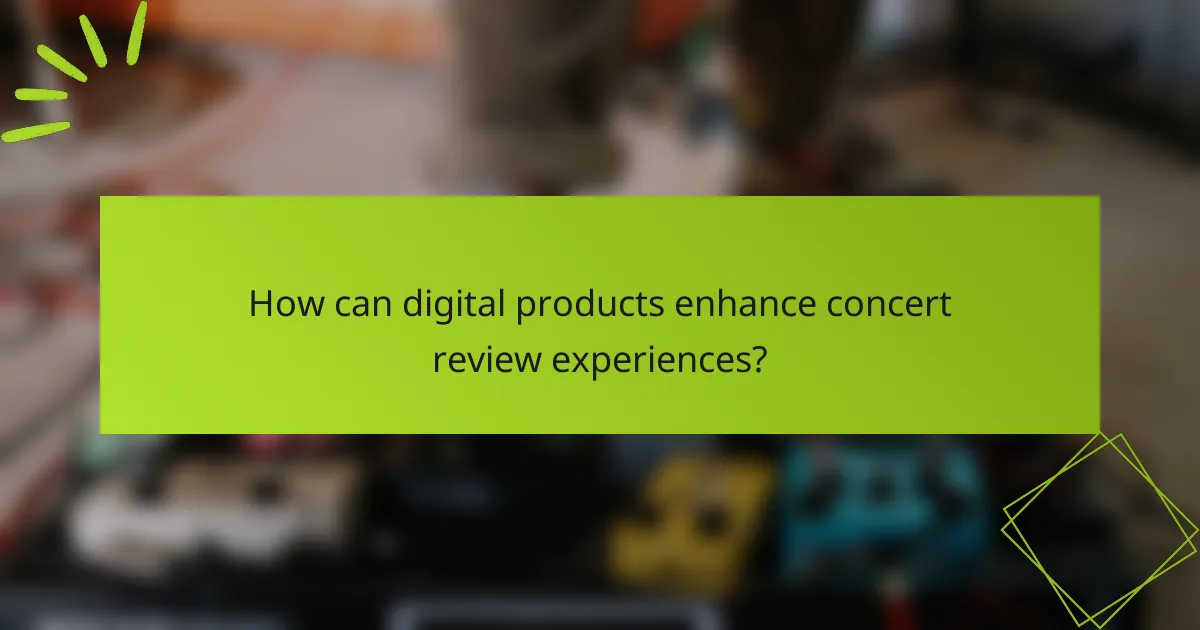
How can digital products enhance concert review experiences?
Digital products can significantly enhance concert review experiences by providing immediate access to reviews and interactive content. These innovations allow audiences to engage with performances in real-time, fostering a deeper connection with the music and artists.
Mobile apps for instant reviews
Mobile apps enable users to submit and read concert reviews instantly, creating a dynamic platform for feedback. Fans can share their experiences through text, photos, and videos right after a show, making the review process more immediate and engaging.
These apps often feature user-friendly interfaces and social sharing options, allowing concert-goers to connect with others and discover new music. Popular apps may include features like rating systems and personalized recommendations based on user preferences.
Subscription services for exclusive content
Subscription services offer fans exclusive access to behind-the-scenes content, interviews, and early ticket sales, enhancing the overall concert experience. By subscribing, users can enjoy curated content that deepens their appreciation for artists and their performances.
These platforms may charge monthly fees, typically ranging from $5 to $15, depending on the level of access provided. Fans should evaluate the value of exclusive content against their interests to determine if a subscription is worthwhile.
Virtual reality concert experiences
Virtual reality (VR) concert experiences allow fans to attend live performances from the comfort of their homes. This technology creates immersive environments where users can feel as if they are part of the audience, regardless of their physical location.
VR concerts can be accessed through various devices, including VR headsets and mobile applications. While some experiences may be free, others could require a ticket purchase, often priced similarly to traditional concert tickets. Fans should consider their equipment and internet capabilities to ensure a smooth viewing experience.
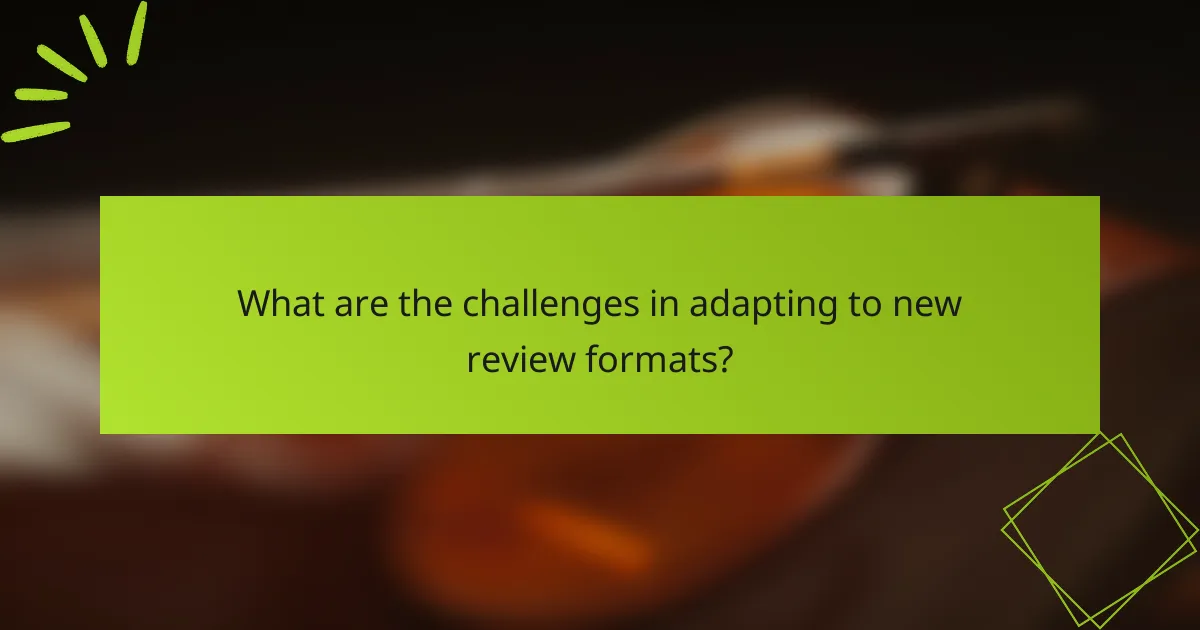
What are the challenges in adapting to new review formats?
Adapting to new review formats presents several challenges, including maintaining audience engagement and ensuring the authenticity of the review. As technology evolves, reviewers must balance innovative presentation methods with the core values of music criticism.
Maintaining journalistic integrity
Maintaining journalistic integrity in live concert reviews is crucial, especially as formats shift towards more interactive and multimedia experiences. Reviewers must ensure that their opinions remain unbiased and grounded in factual reporting, even when utilizing new tools like social media or video content.
One approach is to establish clear guidelines for what constitutes a fair review. This can include avoiding conflicts of interest, disclosing any affiliations with artists, and ensuring that personal biases do not overshadow the performance evaluation. For instance, a reviewer might commit to attending multiple shows before forming a final opinion.
Additionally, transparency with the audience is vital. Reviewers should communicate their criteria for evaluation and the context of their experiences, helping readers understand the basis of their assessments. This builds trust and fosters a more informed audience.
